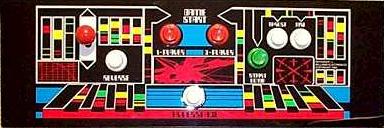 |
| Behind the scenes |
PREPARATION FOR PREPARATION
After a lot of guidance from other marathoners, I did a Defender mini-marathon a couple of weeks earlier to get ready. Read about it here. It taught me a LOT about what support I was going to need that had nothing to do with playing the game.
DO IT BIG OR GO HOME
This event was a big bucket list item for me and there was no way I was going to do it halfway. My wife was just as excited about this as I was, and my family and friends were totally behind it as well. Planning for and executing this Defender marathon required a lot of things to happen all at the same time: getting a referee (Josh Jones) to agree to take the journey with me, lining up time off of work, getting family support, and mechanical and technical support that ensured 80+ hours of uptime on the game machine itself.
There is just NO way to describe how much effort it took to get this whole thing orchestrated that had no direct affiliation with actually PLAYING the game. It was a nightmare that took a lot of people's efforts to pull off.
Here is a SHORT list:
| Charity drive reached its funding goal! |
- The charity drive had to be created. This included finding sponsors, rewards, and advertising the charity drive itself.
- Sponsors for the charity drive had to be made aware of the event and its value to each of them.
- Josh had to work with Record Setter to ensure we had the right clearances and rules understandings.
- Friends, family, and countrymen (i.e. reporters, web interviewers, and historians) had to be made aware of the event to get the appropriate coverage.
- Cameras had to be awesome. We had three. One in the laptop was streaming and two that were watching the action. They were 1080p HD cameras. Thank you Michael Morlan!
| Three cameras = cool |
- Footage had to be live over the internet so we could communicate with people all over the world while it was happening, real time. We used www.twitch.tv on my channel BILLYJOECAINLIVE. The footage can also be viewed anytime here.
- Footage had to be saved locally, in case of internet failure or poor internet performance, which is an issue always.
- Internet speed had to be awesome. I probably spent 16 hours with techs in and out of my house. (What an effort this was). I hate Uverse. Although in the last 2 hours, they were able to identify the main culprit. DROPBOX. I'd highly recommend turning sync off if you are trying to get a consistent internet speed. While you're here, if you've never tried it, please install Dropbox with this link and we'll each get some extra space for free. :)
- The machine had to work flawlessly for 80 hours. They are notorious for failures. They are 33 years old, after all. This was another huge issue which I documented thoroughly on my Facebook. Steve from S & B Amusements came in and saved the day with a new ribbon cable!
| See that big gray ribbon cable? My nemesis. |
- International Press had to be made aware of the event. We got picked up by Kotaku.com, which is a huge gaming site.
- Diet had to be adjusted to perform optimally. Bathroom breaks were expected to be rare.
| UPS Battery Just in Case |
- The machine had to be close to a bathroom. Enough said.
- The machine had to be set up on a UPS just in case the power went out for a few seconds or minutes.
- I spoke to close to a dozen people that have completed marathons on machines that are 30 or more hours long and received a lot of advice on how to perform a marathon. There were a lot of categories of topics. :)
| Didn't get pictures of the cookies. I ate them. |
Behind the scenes, my wife, Jacque, was preparing for more surprises for me. My mom and Uncle Dewey, both of whom were at the First Annual Texas Video Game Championships, both showed up. It was a trip back in time to have them both there, commenting on what it was like to participate back then.
My mom fixed me some of my favorite cookies, vegan-style, so I'd have them at the finish line. PECAN SANDIES! Yum! I had some "vintage" Taco Flavor Doritos ready for me, too.
Jacque had friends showing up at all hours and calling on the phone and through Facetime to support me. It was truly epic.
Thank you, Jacque! You ROCK!
PREVIOUS: WHAT *IS* DEFENDER?
PART ONE: WHAT'S THE BIG DEAL ABOUT DEFENDER?
PART TWO: WHAT *IS* DEFENDER?
PART THREE: NON-GAMING-RELATED PREPARATION
PART FOUR: SPIRITUAL AND PHYSICAL PREPARATION
PART FIVE: THE ATTEMPT, FINAL THOUGHTS AND RESULTS
Want to read each part? Well, here's your chance!
PART ONE: WHAT'S THE BIG DEAL ABOUT DEFENDER?
PART TWO: WHAT *IS* DEFENDER?
PART THREE: NON-GAMING-RELATED PREPARATION
PART FOUR: SPIRITUAL AND PHYSICAL PREPARATION
PART FIVE: THE ATTEMPT, FINAL THOUGHTS AND RESULTS





























